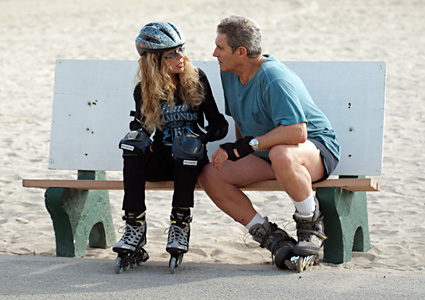

Reviews of Recent Independent, Foreign, & Documentary Films in Theaters and DVD/Home Video
Directed by: Susan Seidelman. Produced by: Florence Seidelman &Susan Seidelman. Written by: Susan Seidelman & Shelly Gitlow, based on a story by Florence Seidelman & David Cramer. Director of Photography: Eric Moynier. Edited by: Keiko Deguchi. Music: Marcelo Zarvos. Released by: Roadside Attractions/Samuel Goldwyn Films. Country of Origin: USA. 104 min. Not Rated. With: Joseph Bologna, Dyan Cannon, Len Cariou, Sally Kellerman, Michael Nouri, Renée Taylor & Brenda Vaccaro.
Boynton Beach Club amusingly and at times poignantly extends and updates
the 1980’s sitcom The Golden Girls. Even the score by Marcelo Zarvos reinforces the show’s sprightliness, as does the washed-out cinematography. Also set in Florida, this film’s relaxed ensemble of seasoned pros portray divorced and widowed residents in an “Active Adult” community in Boynton Beach, each in a different stage of grief and discomfort at commencing active adult dating after long marriages.
Their Bereavement Club meetings bring on the best chuckles with the group’s incongruously gung-ho enthusiasm for grief recovery.
Many of the Florida jokes are familiar, from poking fun at early bird specials and bad drivers to card players ogling a bikini-clad granddaughter at the pool. What is different is the male perspective. The real-life experiences of Florence Seidelman and her friend David Cramer inspired her daughter, director Susan Seidelman (Desperately Seeking Susan), to turn their anecdotes into a screenplay with Shelly Gitlow. Despite the usual Viagra jokes, older men are portrayed sympathetically by Joseph Bologna, as just-bereaved Harry, and Len Cariou as Jack, a potential Lothario.
Besides nostalgic fans of The Golden Girls, Boynton will also appeal to viewers of The OC Michael Nouri plays
here a similar silver fox to his dashing role on that Fox teen favorite. (Coincidentally, there’s a running joke on The OC that
the show’s teens grew up watching Golden Girls reruns; they frequently sing its theme song and refer to the series.) Slinky
Dyan Cannon as Lois and purring Sally Kellerman as Sandy are more sophisticated versions of Rue McClanahan and Betty White, with
hipper jewelry, and Brenda Vaccaro’s Marilyn has the earthiness of Bea Arthur’s Dorothy. Each curses occasionally and a couple
get to flash still-attractive flesh. (The film has no MPAA rating, but would probably be PG-13.) However, the stiff adult
children are one-dimensional and the grandchildren typically rambunctious and rebellious, though Harry’s goth teen granddaughter has her warmhearted moments when she reads her beloved grandmother’s diary.
Twice, the oldsters accuse young folks of treating them as if they’re not intelligent. Ironically, this film almost does too as we
learn very little about them as well-rounded people, such as their interests, backgrounds or what makes each tick, until the seniors
give or get a heartwarming revelation about their lives. These sympathetically sad or angry moments about past hurts rub up
awkwardly with the humor in the brief appearances of raucous Renée Taylor as the cause of another woman’s grief.
Though almost all the actors were born in the 1930’s, the soundtrack confusingly ties these pre-baby-boomer characters
to ‘50’s - early ‘60’s American Bandstand-pop songs. And older gender stereotypes prevail with Marilyn flummoxed by financial affairs and Harry by cooking. Only Jack seems computer literate, with droll consequences as he unexpectedly finds first an avid playmate then an old friend via the internet. Filmed on location, Kevin Kropp’s production design does look like the Boynton residents are living in real retirement houses, from the plastic covering of furniture to shelves of family photographs.
With Jack boasting he “can drive at night,” these white middle-class folks exhibit a refreshing lack of smarminess towards sex and have neither health nor financial problems. Within its lightweight parameters, this is an unusually lively and positive, if superficially presented, portrait of older adults today, complete with an upbeat ending.
Nora Lee Mandel
|